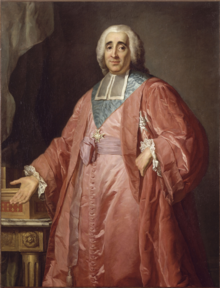René Nicolas Charles Augustin de Maupeou
René Nicolas de Maupeou | |
|---|---|
 Portrait by Pierre Lacour | |
| Chancellor of France | |
| In office 16 September 1768 – 1 July 1790 | |
| Preceded by | René Charles de Maupeou |
| First president of the parlement of Paris | |
| In office 12 October 1763 – 15 September 1768 | |
| Preceded by | Mathieu-François Molé |
| Succeeded by | Étienne François d'Aligre |
| Personal details | |
| Born | 25 February 1714 Chief Minister of France
|
René Nicolas Charles Augustin de Maupeou[1] (French: [mopu]; 25 February 1714 – 29 July 1792) was a French lawyer, politician, and chancellor of France, whose attempts at reform signalled the failure of enlightened despotism in France. He is best known for his effort to destroy the system of parlements, which were powerful regional courts, in 1770–74. When King Louis XV died in 1774, the parlements were restored and Maupeou lost power.
Early life
He was born in
In 1744 he married a rich heiress, Anne de Roncherolles (1725–1752), a cousin of
He determined to support the royal authority against the parlement, the perennial block to reforms of the
When the parlement showed signs of hostility against Aiguillon, Maupeou read letters patent from Louis XV annulling the proceedings. Louis replied to remonstrances from the parlement by a lit de justice, in which he demanded the surrender of the procedural minutes. On 27 November 1770 appeared the Édit de règlement et de discipline, which was promulgated by the chancellor, forbidding the union of the various branches of the parlement and correspondence with the provincial magistratures. It also made a strike on the part of the parlement punishable by confiscation of goods, and forbade further obstruction to the registration of royal decrees after the royal reply had been given to a first remonstrance. This edict the magistrates refused to register, and it was registered in a lit de justice held at Versailles on 7 December, whereupon the parlement was suspended in its functions.
Coup
After five summonses to return to their duties, the magistrates were surprised individually on the night of 19 January 1771 by
Voltaire praised this revolution, applauding the suppression of the old hereditary magistrature, but by the aristocrats and the noblesse de robe, Maupeou's policy was regarded as the triumph of tyranny. The remonstrances of the princes, of the nobles, and of the minor courts, were met by exile and suppression, but by the end of 1771, the new system of the parlements de Maupeou was established, and the Bar, which had offered a passive resistance, recommenced to plead. A renewed attempt was made to tax the privileged and exempted groups. But it was not merely the death of Louis XV in May 1774 that ruined the chancellor: Durand Echeverria characterized the dismissal of Maupeou as "the inevitable liquidation of an exhausted expedient".[4]
Fall
The immediate restoration of the parlements by
Maupeou lived in retreat, still holding the office of Chancellor (abolished 1 July 1790) until his death at Thuit (Eure) in 1792, having lived to see the overthrow of the ancien régime. His work, in so far as it was directed towards the separation of the judicial and political functions and to the reform of the abuses attaching to a hereditary magistrature, was subsequently endorsed by the Revolution. He had aimed at securing absolute power for Louis XV, but his intrigues and the violence of his judicial actions were in reality a serious blow to the monarchy. "By pressing the issue of sovereignty to an ultimate confrontation in this way," remarks Keith Michael Baker[6] of Maupeou's staffing his remodelled courts with men willing to exercise judicial functions within limits imposed by the royal will, "he undermined in practice exactly that belief in a constitutional middle ground between liberty and despotism that Guillaume-Joseph Saige had been concerned to deny in theory".
Issue
He had two sons:
- René Ange Augustin de Maupeou (1746–1794), who became maître de camp of the Royal-Burgundy cavalry regiment].
- Charles Victor René de Maupeou (1749–1789), who became maître des requêtes.
See also
- Maupeou Family
Notes
- ^ He was marquis de Morangles and de Bully, vicomte de Bruyères.
- duc de Choiseulhas been overplayed.
- ^ Durand Echeverria, The Maupeou Revolution: A Study in the History of Libertarianism, France, 1770-1774 (1985)
- ^ Echeverria's assessment "rings true", according to Bailey Stone, Reinterpreting the French Revolution: a global-historical perspective 2002:36.
- ^ "J'avais fait gagner au roi un procès qui dure depuis trois cents ans. Il veut le reperdre, il en est le maître."
- ^ Baker, Inventing the French Revolution: essays on French political culture in the eighteenth century, 2nd ed. 1990 :139.
Further reading
- Bell, David A. "Lawyers into Demagogues: Chancellor Maupeou and the Transformation of Legal Practice in France 1771-1789." Past and Present (1991): 107–141. in JSTOR
- Doyle, William. "The Parlements of France and the Breakdown of the Old Regime 1771-1788." French Historical Studies (1970): 415-458 in JSTOR.
- Echeverria, Durand. The Maupeou Revolution: A Study in the History of Libertarianism, France, 1770-1774 (Louisiana State University Press, 1985)
- Jones, Colin. The Great Nation: France from Louis XV to Napoleon (2003) pp 280–98
- Swann, Julian. Politics and the Parlement of Paris under Louis XV, 1754-1774 (Cambridge University Press, 1995)
- This article incorporates text from a publication now in the public domain: Chisholm, Hugh, ed. (1911). "Maupeou, René Nicolas Charles Augustin". Encyclopædia Britannica. Vol. 17 (11th ed.). Cambridge University Press. pp. 906–907.

